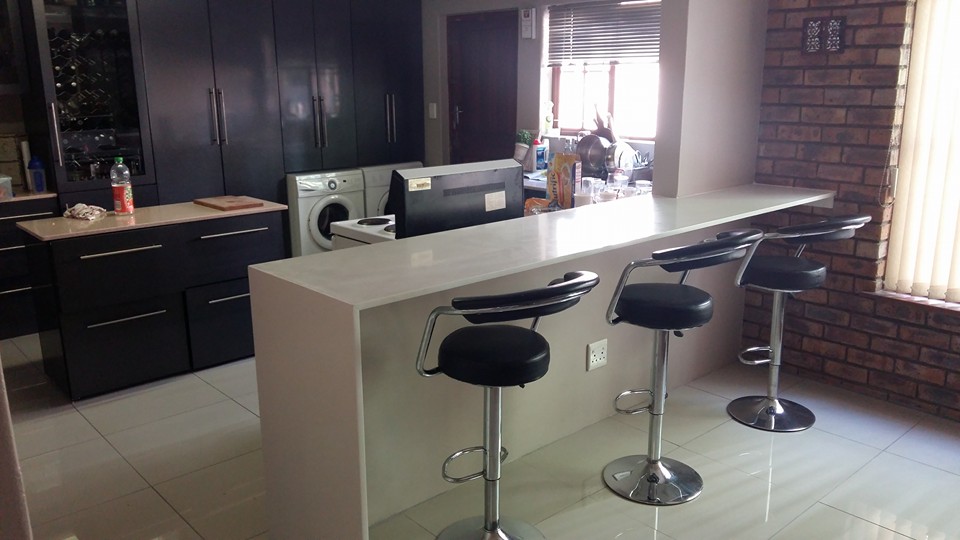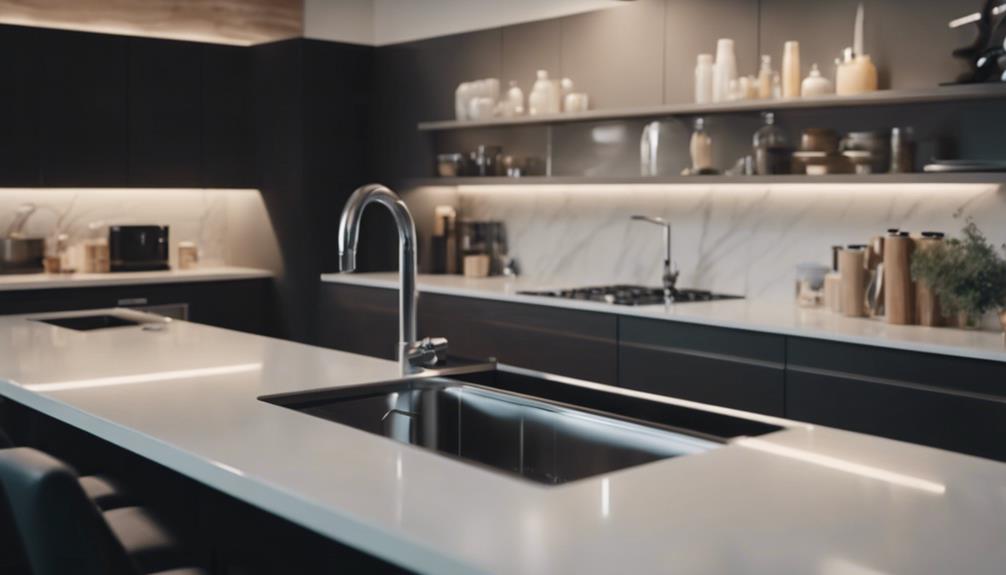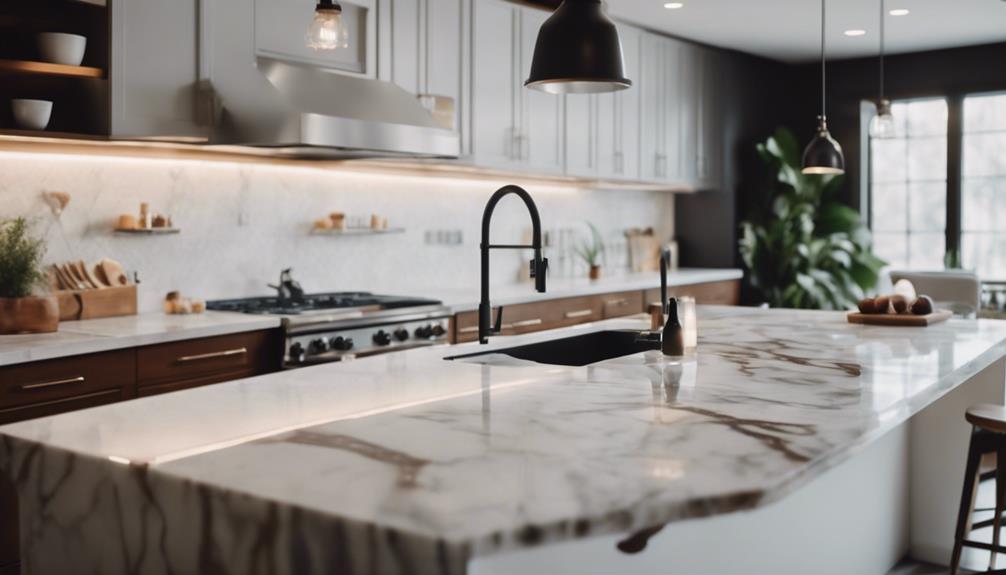In the world of home aesthetics and preservation, the allure of marble countertops is undeniable. Their elegance and enduring nature make them a coveted choice. But the secret to maintaining their pristine look and longevity lies in the application of an appropriate sealant.
The task of picking the perfect sealant for your marble countertops, however, can be a labyrinth—given the sheer number of options flooding the market.
As a connoisseur of countertop care, I understand the challenge you face. Selecting the right sealant requires knowledge of their types, application techniques, and upkeep considerations. Fear not, for this guide is designed to illuminate these aspects, speaking directly to your needs.
Whether you're a seasoned homeowner or a newbie in countertop care, these insights aim to empower you to make informed decisions. So, let's embark on this journey together, exploring the intricacies of marble countertop sealants and ensuring the continued splendor and integrity of your countertops.
With this knowledge in hand, the beauty of your marble countertops will remain a testament to your discerning taste and meticulous care.
Characteristics and Types of Marble Sealers
When selecting a marble sealer, it is essential to consider the characteristics and types available to ensure the appropriate level of protection and desired aesthetic enhancement for your countertops.
There are various types of marble sealers, each with its own unique characteristics and benefits. Solvent-based sealers offer high levels of protection and are best suited for high-use areas, providing a durable shield against stains and spills.
On the other hand, water-based sealers are environmentally friendly, emit minimal odor, and are suitable for areas where ventilation may be a concern.
Penetrating sealers are designed to soak into the pores of the marble, offering long-lasting protection from within, while surface sealers create a protective layer on top of the marble surface.
Additionally, enhancing sealers are specifically formulated to bring out the richness and depth of color in marble countertops, adding a luxurious touch to the natural stone.
Understanding the characteristics and types of marble sealers is essential for making an informed decision and ensuring the best professional sealing for your marble countertop to protect its natural beauty.
Importance of Sealing Marble Countertops
To truly appreciate the significance of sealing marble countertops, one must recognize the pivotal role it plays in safeguarding against permanent stains and maintaining the pristine condition of the natural stone, as discussed in the characteristics and types of marble sealers.
The importance of sealing marble countertops cannot be overstated. By applying a quality sealer, natural stone surfaces are better equipped to withstand potential damage caused by spills, acidic substances, and general wear and tear. Sealing not only protects the marble from unsightly stains but also makes cleaning and maintenance much easier.
It forms a barrier that prevents liquids and other contaminants from penetrating the surface, thereby extending the lifespan of the countertops. Furthermore, a professional sealing job using appropriate equipment and the right marble countertop sealants can significantly reduce the risk of etching and discoloration, ensuring that the marble retains its original beauty for years to come.
Therefore, the sealing process is an integral part of caring for marble countertops, providing essential protection and preservation.
Application Process for Marble Sealers
The application process for marble sealers involves careful preparation and precise techniques to ensure comprehensive coverage and effective protection of the natural stone surface. To apply a marble countertop sealer, follow these practical steps:
- Begin by masking off the surrounding surfaces with painters tape to protect them from the sealer.
- Use a foam brush for corners and edges, ensuring thorough coverage, and then switch to an applicator pad for the rest of the surface.
- Ensure all surfaces, including edges and under the lip of appliances, are covered with the sealer.
- Let the first coat sit wet for 15-20 minutes to allow the sealer to penetrate the marble, then wipe off any excess with a terrycloth towel.
- Apply a second coat of sealer following the same steps as the first coat to enhance the protection.
Indoor Vs Outdoor Marble Sealers
After carefully applying the marble countertop sealer with meticulous precision, the decision between indoor and outdoor sealers becomes crucial to ensure the lasting protection and aesthetic appeal of the natural stone surface.
Indoor marble sealers are tailored for controlled environments, shielding against stains from food and beverages. They prioritize a polished appearance, ideal for indoor marble countertops.
On the other hand, outdoor marble sealers are formulated to endure exposure to natural elements such as sunlight, rain, and temperature fluctuations. These sealers emphasize resilience against harsh weather conditions and often contain UV inhibitors to prevent sun damage. They are designed to safeguard against environmental factors like water, dirt, and UV rays, ensuring the longevity of outdoor marble surfaces.
When choosing a marble sealer, it is essential to consider the specific location and usage to determine whether an indoor or outdoor sealer is more suitable for the application. While indoor sealers focus on maintaining a pristine look, outdoor sealers prioritize functionality and durability against outdoor elements, providing comprehensive protection for both indoor and outdoor marble countertops.
Pros, Cons, and Care of Marble Sealants
When considering the application of marble sealants, it is essential to weigh the advantages and disadvantages, as well as implement proper care to maintain the pristine condition of the countertops. Here are some key points to consider:
- Protective Layer: Marble sealants provide exceptional stain resistance, making cleaning easier and extending the lifespan of countertops.
- Periodic Reapplication: Cons of marble sealants involve the need for periodic reapplication to maintain their protective properties.
- Careful Selection: When choosing a marble sealer, consider factors like penetrating power, breathability, and long-lasting protection, as well as the specific needs of the countertop.
- Proper Care: Proper care of marble sealants includes using pH-neutral cleaners, avoiding harsh chemicals, and periodic reapplication as needed.
It's important to note that while marble sealers offer a high level of protection, they can emit toxic fumes during application, so a professional job ends up being the best course of action. Additionally, some sealers may alter the appearance of the marble, so it's crucial to choose the right type of sealer for your specific needs.
Popular Commercial Marble Sealers
When it comes to protecting your marble countertops, selecting the right commercial sealer is crucial. The best commercial sealers offer superior durability and stain resistance, providing long-lasting protection for your investment.
Application tips and techniques for achieving a natural-looking finish are also essential for ensuring the optimal performance of the sealer.
Best Commercial Sealers
Among the popular commercial marble sealers renowned for their exceptional durability and superior protection, StoneTech BulletProof Sealer stands out with its remarkable stain resistance.
When choosing a sealer for your specific marble countertops, consider the following options:
- Miracle Sealants 511 Impregnator: Offers a deep-penetrating formula for superior protection.
- Tenax Proseal Premium Stone Sealer: Provides a natural-looking finish and is food-safe.
- Aqua Mix Sealers Choice Gold: A favorite among professionals, offering robust protection.
- Research and Consultation: Read reviews and consult professionals to determine the best sealer for your needs.
To protect marble surfaces and prevent stains, it's essential to ensure compatibility with natural stones. Always follow the manufacturer's instructions, including the application of the second coat for excellent stain resistance.
Application Tips
How can one ensure precise and thorough application of popular commercial marble sealers to achieve optimal protection for the countertops?
When applying a marble sealer, it's crucial to use a foam brush for corners and edges, and an applicator pad for the rest of the surface. Ensure complete coverage, including edges and under the lip of appliances.
Start with a small section to get the hang of the application process. Let the first coat sit wet for 15-20 minutes, then wipe off any excess with a terrycloth towel.
Apply a second coat following the same steps as the first. Once the sealer is applied, allow it to form a protective barrier. After the clean time, remove any excess sealer and buff dry.
These tips ensure optimal protection when using a marble countertop.
Long-Lasting Protection
For long-lasting protection of marble countertops, selecting a high-quality commercial sealer with exceptional durability and stain resistance is essential. When considering the best sealant for your marble countertop, the following options are recommended for their proven track record in providing robust protection:
- StoneTech BulletProof Sealer: Offers exceptional durability and stain resistance.
- Miracle Sealants 511 Impregnator: Features a deep-penetrating formula for superior protection.
- Tenax Proseal Premium Stone Sealer: Provides a natural-looking finish and is food-safe.
- Aqua Mix Sealers Choice Gold: A favorite among professionals, offering robust protection.
To ensure the best choice for your specific needs, it is advisable to read reviews and consult with professionals who specialize in the sealing process. By selecting the right sealer, you can effectively contribute to the long-term maintenance of your marble countertop.
DIY Guide for Sealing Marble Countertops
When it comes to sealing marble countertops, the DIY approach can be an effective and cost-efficient option.
This process involves understanding the sealing process and choosing the right sealant for the job.
Sealing Process
To effectively seal marble countertops, it is essential to use impregnating sealers that slow the absorption of staining liquids, providing a protective barrier against potential damage and contaminants.
- Use painters tape to protect surrounding surfaces and start with a small section when applying the sealer.
- After applying the second coat of sealer, buff the surface with a microfiber cloth or terry towel attached to a cordless drill or orbital sander.
- Special etch-remover products can be used to remove etching on countertops, and honed countertops may make etches less noticeable compared to polished countertops.
- Marble sealer creates a protective barrier against liquids and contaminants, making it crucial for protecting countertops.
Recommended Sealants
One effective approach for sealing marble countertops at home involves using impregnating sealants specially formulated to slow the absorption of staining liquids while providing a protective barrier against potential damage and contaminants.
When selecting a sealant for your marble countertop, it is essential to choose a product that is oleophobic and hydrophobic to protect against oil and water-based stains. For kitchen use, ensure the sealer is food-safe.
Sealers can have carriers like water, alcohol, or other solvents, so it's important to consider the specific needs of your countertop.
Recommended companies for stone care products include Tenax, Dry-Treat, Miracle, Laticrete/StoneTech, MORE, MB Stone Care, F.I.L.A., and HMK.
Frequently Asked Questions
How Do You Apply Marble Counter Sealer?
When applying marble countertop sealer, use impregnating sealers for a protective layer. Apply with a foam brush and applicator pad, allowing each coat to dry for 15-20 minutes. Buff the surface for best results. Maintain with regular resealing and avoid water-based cleaning products.
How Do I Choose Marble Sealer?
When choosing a marble sealer, consider its effectiveness, application process, durability, and maintenance requirements. Look for a sealer that offers long-lasting protection, compatible with marble, provides the desired finish, and fits your budget. Explore reputable brands for quality options.
What Product Do You Use to Seal Marble Countertops?
The best sealant for marble countertops is a high-quality impregnating sealer. Application involves thoroughly cleaning the surface, applying the sealer evenly, and allowing it to penetrate. Sealant types vary, but durability and protection are key. Regular maintenance ensures long-lasting effectiveness. Recommended brands include Tenax, Dry-Treat, and Miracle.
How Long to Leave Sealer on Marble?
After the sealing process, it's crucial to allow the sealer to dry for the recommended time, typically 15-20 minutes for the first coat and 24 hours for subsequent coats. Regular maintenance, proper application, and the choice of sealer type are essential for effective protection against stains and preserving the natural beauty of marble countertops.















